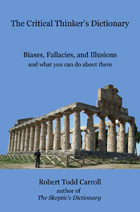From Abracadabra to Zombies | View All
hindsight bias
Hindsight bias is the tendency to construct one's memory after the fact (or interpret the meaning of something said in the past) according to currently known facts and one's current beliefs. In this way, one appears to make the past consistent with the present and more predictive or predictable than it actually was.
Hindsight bias accounts for the tendency of believers in prophecies and psychic predictions to retrofit events as they occur to past oracular claims, however vague or obscure (retroactive clairvoyance). For example, after the Challenger space shuttle disaster that killed seven U.S. astronauts on January 28, 1986, hindsight bias was used by followers of Nostradamus to claim that he had predicted it in the following verse:
D'humain troupeau neuf seront mis à part,
De jugement & conseil separés:
Leur sort sera divisé en départ,
Kappa, Thita, Lambda mors bannis égarés.
From the human flock nine will be sent away,
Separated from judgment and counsel:
Their fate will be sealed on departure
Kappa, Thita, Lambda the banished dead err (I.81).
Of course, to make the obscene retrodiction complete, Nostradamus's minions would have to speculate that teacher-astronaut Christa McAuliffe was pregnant with twins to make nine in the total in the "flock."
Hindsight bias also seems to account for the tendency of many people to think they can explain events that weren't predicted (like the 9/11 attacks, the collapse of the stock market, and wars) after the events have happened. It is unacceptable to many people to think that major events like a respected Wall Street investment manager running a Ponzi scheme that cost people perhaps as much as $50 billion wasn't predictable. If only somebody had paid attention to this and that detail, Bernard Madoff could never have pulled it off. What is true is that a major impact event like this can be explained after the fact. The explanations may satisfy people and lead them to believe that they now understand how such an event happened, but there is no way to know whether collecting many facts and using them to explain what occurred will help prevent a similar event from happening in the future. On the other hand, it is certainly possible to use hindsight bias to explain why an event didn't happen. We do this whenever an underdog defeats a heavily favored opponent.
See also hidden persuaders for a list of other cognitive biases, as well as a list of perceptual and emotive biases, that hinder our ability to think critically.
further reading
Levine, Robert. 2003. The Power of Persuasion: How We're Bought and Sold. John Wiley & Sons.
Sutherland, Stuart. 1992. rev. 2nd ed. Irrationality. Pinter and Martin.
Taleb, Nassim Nicholas. 2007.
The Black Swan: The Impact of the Highly
Improbable. Random House.
news
That Guy Won? Why We Knew It All Along
“The important thing to know about hindsight bias is that it not only changes how you see the world, but also how you see yourself in it,” said Neal Roese, a professor of marketing at the Kellogg School of Management at Northwestern University, who just published a review paper on the bias with Kathleen D. Vohs of the University of Minnesota. “You begin to think: ‘Hey, I’m good. I’m really good at figuring out what’s going to happen.’ You begin to see outcomes as inevitable that were not.


